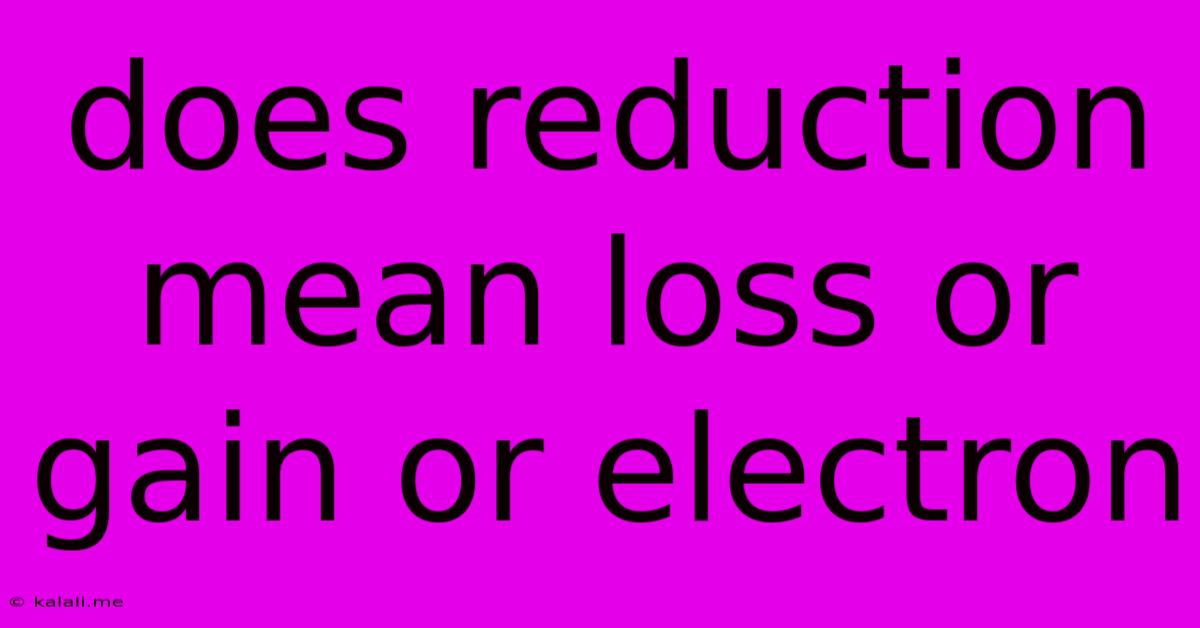Does Reduction Mean Loss Or Gain Or Electron
Kalali
Jun 04, 2025 · 3 min read

Table of Contents
Does Reduction Mean Loss or Gain of Electrons? Understanding Redox Reactions
The terms "oxidation" and "reduction" are fundamental concepts in chemistry, often taught together as "redox" reactions. Understanding whether reduction involves a gain or loss of electrons is crucial for mastering this area. This article will clarify the meaning of reduction in the context of electron transfer, exploring its implications and providing clear examples.
In short: Reduction means a gain of electrons.
This is a key concept often remembered using the mnemonic OIL RIG – Oxidation Is Loss, Reduction Is Gain (of electrons). When a chemical species undergoes reduction, its oxidation state decreases because it's acquiring negatively charged electrons.
Understanding Oxidation States
Before delving deeper, let's briefly revisit oxidation states. The oxidation state, or oxidation number, represents the hypothetical charge an atom would have if all bonds to atoms of different elements were 100% ionic. It's a useful tool for tracking electron transfers in redox reactions. Elements in their elemental form have an oxidation state of 0.
Reduction: The Gain of Electrons
Reduction involves a decrease in the oxidation state of an atom, ion, or molecule. This decrease occurs because the species is gaining electrons. These added electrons increase the negative charge or decrease the positive charge of the species. This process is always coupled with oxidation, where another species loses electrons.
Examples of Reduction:
-
The formation of sodium chloride (NaCl): Sodium (Na) loses an electron (oxidation), becoming Na⁺, while chlorine (Cl) gains an electron (reduction), becoming Cl⁻. Chlorine's oxidation state decreases from 0 to -1.
-
The reduction of iron(III) ions (Fe³⁺) to iron(II) ions (Fe²⁺): Fe³⁺ gains an electron, reducing its oxidation state from +3 to +2. This often happens in the presence of a reducing agent, a species that readily donates electrons.
-
The reduction of oxygen (O₂) to water (H₂O): Oxygen in O₂ has an oxidation state of 0. In water, oxygen's oxidation state is -2. This means each oxygen atom has gained two electrons during the reduction process.
Differentiating Reduction from Loss
It's crucial to emphasize that reduction never involves a loss of electrons. A loss of electrons is the defining characteristic of oxidation. Confusing these two processes will lead to misconceptions about redox reactions and their implications.
Recognizing Reduction in Chemical Equations
Identifying reduction in a chemical equation involves observing changes in oxidation states. If the oxidation state of an atom decreases, it signifies reduction. You might also see the explicit addition of electrons to the reactant side of a half-reaction equation.
Conclusion: Reduction, a Fundamental Process
Reduction is a fundamental process in numerous chemical and biological systems. Understanding that it involves a gain of electrons is essential for correctly interpreting redox reactions and predicting their outcomes. Remembering OIL RIG and practicing with various examples will solidify your grasp of this crucial concept. By mastering the concept of reduction, you will unlock a deeper understanding of chemical reactions and their roles in various fields.
Latest Posts
Latest Posts
-
Can You Pray Fajr After Sunrise
Jun 06, 2025
-
Use A Laptop As A Monitor
Jun 06, 2025
-
Bread Machine Yeast Vs Instant Yeast
Jun 06, 2025
-
Cooking Burgers In Water On Stove
Jun 06, 2025
-
Hanging Pictures On A Concrete Wall
Jun 06, 2025
Related Post
Thank you for visiting our website which covers about Does Reduction Mean Loss Or Gain Or Electron . We hope the information provided has been useful to you. Feel free to contact us if you have any questions or need further assistance. See you next time and don't miss to bookmark.